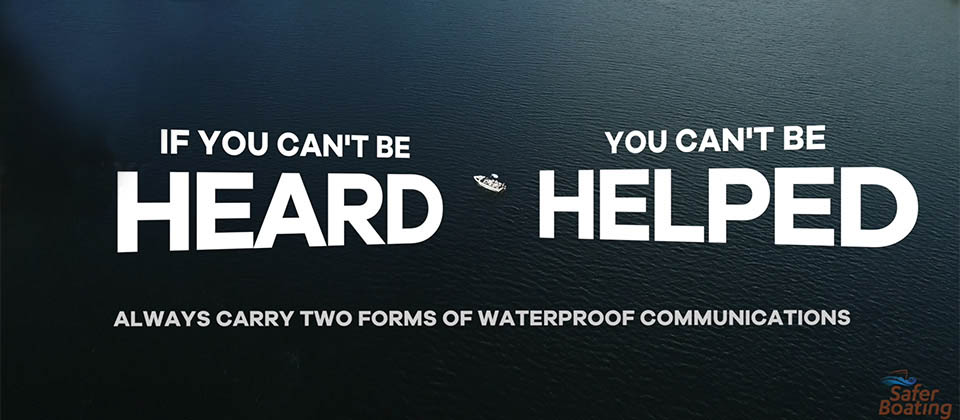Waterproof communications
Always carry two waterproof ways to call for help
When you’re out on the water, every skipper should carry at least two forms of waterproof communication that will work even when wet. You also need to be able to contact someone on land from anywhere you plan to head out on your boat, and that they will work for the duration of your trip.
If you can’t be heard, you can’t be helped!
Your communication tools
Communications is an essential part of safe boating. If you can’t call for help, no one can rescue you. Find out what types of waterproof communications are available, so you are prepared for where you’re going.
Marine VHF Radio
Coastal & inland (limited)
A handheld waterproof VHF radio is the most reliable two-way device to call for help when out in coastal waters. However VHF may not always be suitable for inland rivers and lakes because of limited coverage, so always check beforehand.
Did you know?
As a minimum requirement, any person using a maritime VHF radio must hold a Maritime VHF Radio Operator Certificate (unless transmitting in an emergency or a distress situation). Certification is available through Coastguard Boating Education www.boatingeducation.org.nz or call 0800 40 80 90.
For information on VHF channels and trip reports with Coastguard NZ head to coastguard.nz/boating-safely/communications/
Cell phone
Coastal & Inland (limited)
Cell phones are rarely waterproof, so always keep your cell phone in a sealed waterproof bag or case worn around your neck or in your pocket so that you can still use it if you are in the water. Remember, not all locations have cell phone coverage, particularly on remote lakes and rivers, and it’s battery life may not always last the journey so make sure to take another form of communication that will work.
Distress Beacons
Coastal & Inland
Whether you’re in coastal waters or remote inland areas, body worn PLBs and EPIRBs are the best way of letting people know that you urgently need help. You must register your beacon with Rescue Coordination Centre New Zealand (RCCNZ) and make sure your details are up to date so rescuers are able to help you fast! It’s also important to regularly check your beacon’s battery life.
Flares
Coastal & Inland
Always carry torches or flares (we recommend red hand held flares). These are essential so rescuers can locate you, particularly at night or in poor visibility.
When at sea - Waterproof communications
When on rivers and lakes - Waterproof communications
All the options - Waterproof communications

